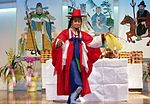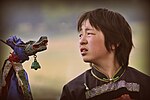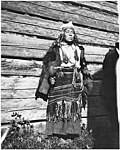Korean shamanism, also known as musok (Korean: 무속; Hanja: 巫俗) or Mu-ism (무교; 巫敎; Mugyo), is a spiritual practice from Korea. Scholars of religion classify...
115 KB (14,153 words) - 06:13, 4 November 2024
Mu (Korean: 무) is the Korean term for a shaman in Korean shamanism. Korean shamans hold rituals called gut for the welfare of the individuals and society...
22 KB (2,896 words) - 08:16, 15 October 2024
Korean mythology (Korean: 한국 신화; Hanja: 韓國神話; MR: Han'guk sinhwa) is the group of myths told by historical and modern Koreans. There are two types: the...
100 KB (13,359 words) - 04:34, 7 November 2024
peer-reviewed academic journal being devoted to the study of shamanism. The Modern English word shamanism derives from the Russian word шаман, šamán, which itself...
80 KB (8,966 words) - 19:57, 26 October 2024
in: Chang Soo-kyung, Kim Tae-gon. Korean Shamanism – Muism. Jimoondang, 1998. Used in: Margaret Stutley. Shamanism: A Concise Introduction. Routledge...
49 KB (5,609 words) - 14:52, 19 October 2024
times. Korean shamanism, or musok (무속; 巫俗), is one of the oldest religions in Korea, and still survives to this day. Practitioners of Korean shamanism are...
58 KB (6,808 words) - 01:54, 26 October 2024
shamanism have experienced a revival in South Korea. Since the 1990s, shamans started to be regarded as "bearers of culture". Today, Korean shamanism...
8 KB (886 words) - 12:28, 2 November 2024
version of Neo-Confucianism (i.e. Korean Confucianism) and suppressed and marginalised Korean Buddhism and Korean shamanism. Buddhist monasteries were destroyed...
75 KB (7,251 words) - 12:01, 3 November 2024
A Korean traditional funeral features Korean Confucianism as well as centuries of indigenous Shamanism. Numerous anthropological scholars have attempted...
16 KB (2,262 words) - 00:00, 31 March 2024
traditions practiced on the Korean peninsula. The oldest indigenous religion of Korea is the Korean folk religion (a version of Shamanism), which has been passed...
38 KB (3,804 words) - 23:05, 18 October 2024
life in Korea, often Korean Shamanism, Korean Taoism, Korean Buddhism, Korean Confucianism and Silhak movements have shaped Korean life and thought. From...
10 KB (1,297 words) - 23:05, 16 October 2024
Cho Chi-hun. Korean folk religion (민속신앙) remains a part of the lives of modern Koreans. Korean folk religions are based on Korean shamanism and foreign...
34 KB (4,318 words) - 22:42, 6 March 2024
Republic of Korea in the south. North Korean invasion of South Korea in 1950 started the Korean War. In 1953, the Korean Armistice Agreement brought about...
287 KB (25,727 words) - 02:27, 7 November 2024
Superstition in Korea, rooted in Korean shamanism, exists in many parts of Korean life. In Korean shamanic faith, folk beliefs have been passed down through...
13 KB (1,440 words) - 05:41, 1 October 2024
Eastern religions (section Shamanism and animism)
Shamanism and animism have historically been practised in Asia, and is still practiced in most of Asia. Mongolian shamanism Tengrism Korean shamanism...
23 KB (2,492 words) - 18:58, 22 October 2024
comeback. Yellow shamanism defines a distinct form of shamanism practiced in Mongolia and Siberia. The term "yellow" in "Yellow Shamanism" is derived from...
24 KB (2,886 words) - 01:33, 21 September 2024
Gasin faith (category Articles containing Korean-language text)
In Korean shamanism, Gasin (Korean: 가신; Hanja: 家神; lit. God of the house) are a branch of deities believed to protect the various objects and rooms of...
6 KB (805 words) - 13:41, 2 July 2024
Korea (Korean: 한국, romanized: Hanguk in South Korea, or 조선, Chosŏn in North Korea) is a peninsular region in East Asia consisting of the Korean Peninsula...
167 KB (15,381 words) - 13:54, 28 October 2024
follow the religio-cultural practices of shamanism. Some researchers regard Siberia as the heartland of shamanism. The people of Siberia comprise a variety...
38 KB (3,732 words) - 07:23, 27 September 2024
Tutelary deity (section Korean shamanism)
referred to a spirit which could be either protective or malevolent. In Korean shamanism, jangseung and sotdae were placed at the edge of villages to frighten...
19 KB (1,996 words) - 11:08, 10 October 2024
Black shamanism (Mongolian: Хар бөө) is a kind of shamanism practiced in Mongolia and Siberia. It is specifically opposed to yellow shamanism, which incorporates...
6 KB (689 words) - 05:38, 11 September 2023
Samsin Halmeoni (category CS1 Korean-language sources (ko))
pregnancy goddessess are also thought of as goddess of childbirth in Korean shamanism. Since the phonetic notation of Sam is 三(means three), it has also...
8 KB (955 words) - 23:09, 29 September 2024
Cheondoism (category CS1 Korean-language sources (ko))
Cheondoism (spelled Chondoism in North Korea; Korean: 천도교; lit. Religion of the Celestial Way) is a 20th-century Korean pantheistic religion, based on the...
12 KB (1,259 words) - 23:47, 18 September 2024
Shamanic music is ritualistic music used in religious and spiritual ceremonies associated with the practice of shamanism. Shamanic music makes use of various...
23 KB (3,230 words) - 06:11, 25 August 2024
Exhuma (category CS1 uses Korean-language script (ko))
highest-grossing South Korean film of 2024 and the sixth highest-grossing South Korean film of all time. Renowned Korean shaman Hwa-rim and her protégé...
31 KB (3,160 words) - 23:21, 3 November 2024
Religious music (category CS1 Korean-language sources (ko))
"Shamanic Ritual". Encyclopedia of Korean Folk Culture (in Korean). Archived from the original on 2022-02-01. Retrieved 2022-05-04. 국립민속박물관. "Shamanic...
47 KB (5,098 words) - 19:48, 26 September 2024
(religion) (신도), an alternative name of Korean Shamanism used by Shamanic associations in modern South Korea. Shindō (surname) T.K. Shindo (1890-1974)...
613 bytes (109 words) - 19:08, 3 January 2023
Shamanism is a religious practice present in various cultures and religions around the world. Shamanism takes on many different forms, which vary greatly...
65 KB (7,884 words) - 22:15, 5 September 2024
Religion in Northeast China (section Korean shamanism)
maintained pure Manchu shamanism. The local Chinese folk religion has developed many patterns inherited from Manchu and Tungus shamanism, making it different...
21 KB (2,171 words) - 06:06, 20 August 2024
Jowangsin (category CS1 Korean-language sources (ko))
Hangul, 조왕신, in hanja, 竈王神) is the goddess of fire and the hearth in Korean shamanism. As the goddess of the hearth, the rituals dedicated to her were generally...
5 KB (728 words) - 01:39, 3 November 2024

















